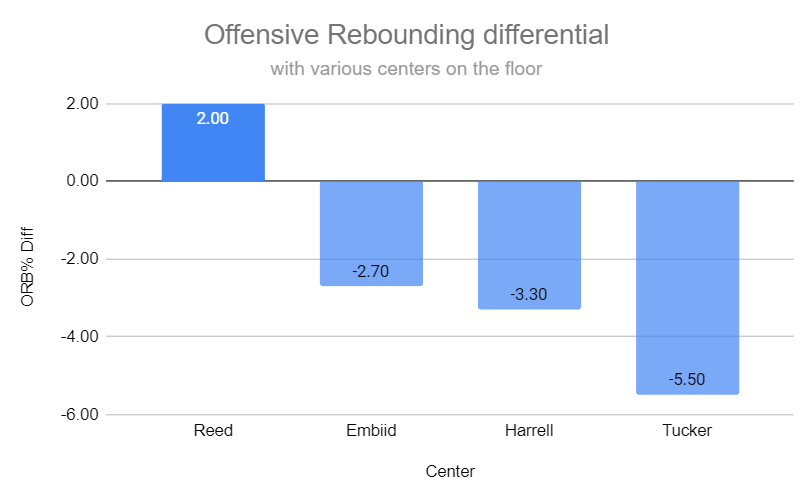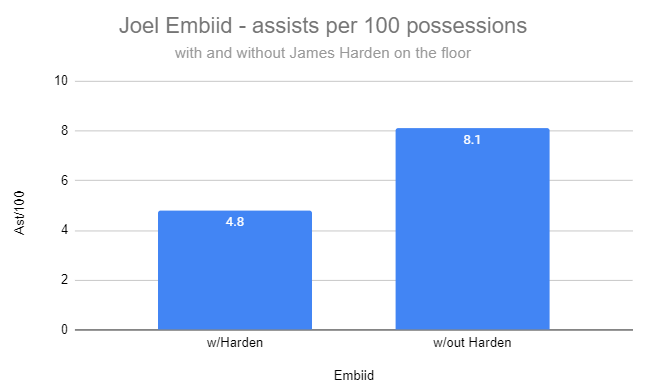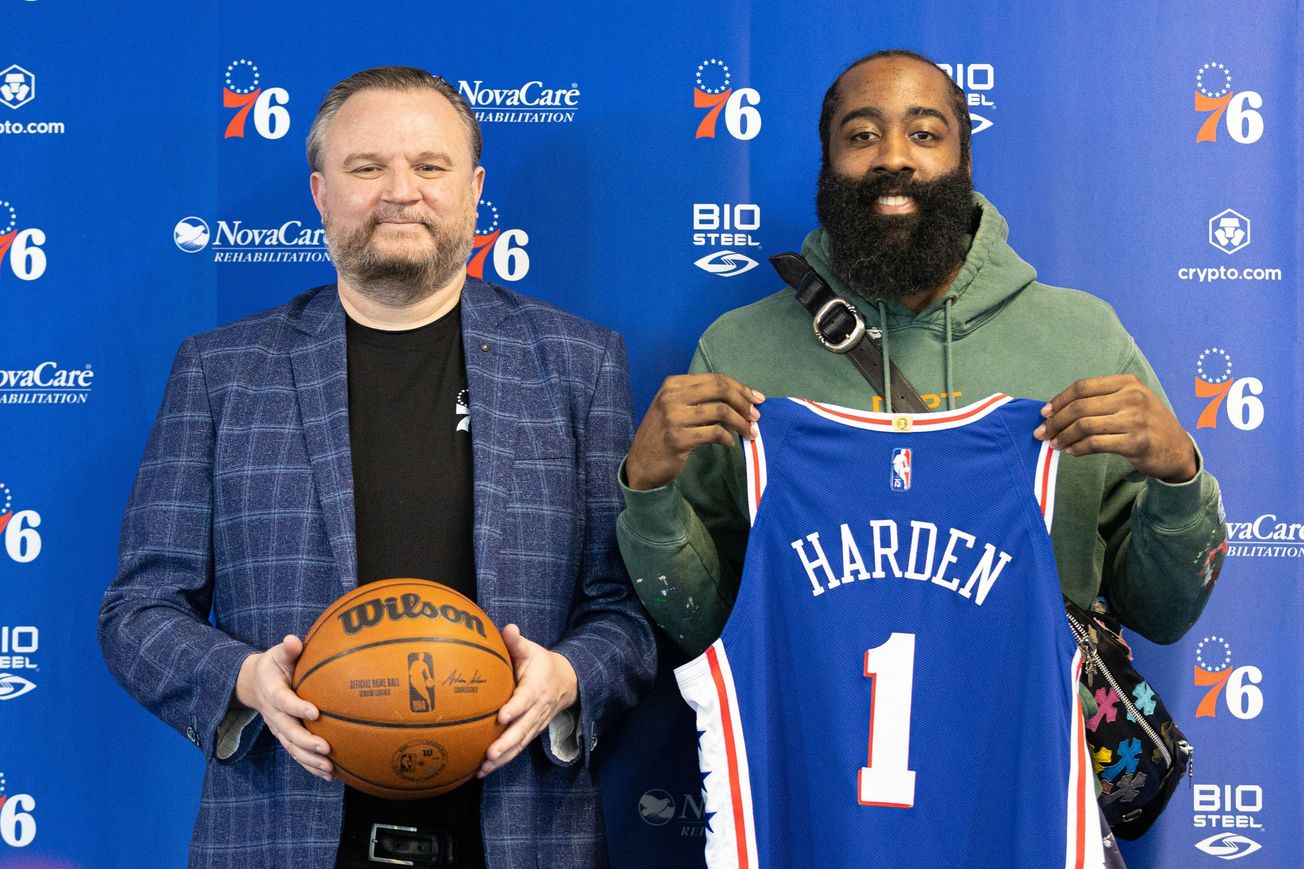Last night's game against the Golden State Warriors kicked off a brutally tough seven game stretch for the Sixers that includes the Warriors, Suns, Nuggets, Bucks and Celtics. This sprint might not only determine whether the Sixers have a chance of capturing the 2nd seed in the East, but given that it includes games against fellow MVP contenders Nikola Jokic and Giannis Antetokounmpo, it also may very well determine whether Joel Embiid brings home his first MVP trophy.
The Sixers' defensive struggles down the stretch of last night's 120-112 loss to the Warriors will be the focus of the second half of this week's Likes and Dislikes column. But before we get to that let's bring up one area where they've been surprisingly good of late...
Like: The Sixers are a good rebounding team?
A couple of weeks ago, while the Sixers were off during the All-Star break, I noted that the Sixers had a 19-1 record when they won the rebounding battle, but that they won that rebounding battle very infrequently (20 times out of 57 games) compared to other contenders.
Since returning from the All-Star break the Sixers have won the rebounding battle nine times out of 16 games, and have gone 7-2 in games where they have an edge in rebounding. That brings their season record when outrebounding their opponent to 26-3.
While they have improved on both ends of the floor, the most significant improvement has come on the defensive end, where the Sixers have collected 74.7% of their available defensive rebounds since the All-Star break, per NBA.com. That ranks as the 5th best rate in the league over that span, and is a drastic improvement over their pre-ASB numbers (71.4%, 18th).
| Timeframe | ORB% | DRB% | TRB% |
|---|---|---|---|
| Pre-ASB | 25.1% (26th) | 71.4% (18th) | 48.8% (25th) |
| Post-ASB | 27.4% (16th) | 74.7% (5th) | 52.6% (4th) |
A big part of this turnaround comes down to the fact that the Sixers stopped playing their shitty rebounders.

One note on the Embiid numbers above: he's in the negative largely because the Sixers virtually abandon pursuing offensive rebounds while he's on the floor, collecting offensive rebounds on just 22.8% of their chances with Embiid on the court. Despite having a relative down year on the defensive glass this season, the Sixers continue to have their best defensive rebounding rate when Embiid is on the floor (74.5%), with Reed (73%), Harrell (71.6%) and Tucker (70.7% while at center) all coming in lower.
The one that really sticks out here is Harrell, in large part because he doesn't do anything else to offset the drop in rebounding the Sixers see while he's playing. With Tucker at center you can at least run a five out offense and pick apart bench units, and with Embiid on the court...well, we know what he adds to the team. But Harrell's defense is atrocious, he doesn't protect the rim, can't defend in space, and he doesn't spread the floor on the other end.
One of my under-the-radar positive takeaways over the past few weeks is that Doc Rivers continues to go back to Paul Reed as the backup center even after Reed struggles, like he did last night. Harrell has seen just six total minutes since the break, and that needs to continue. There might have been some bumps along the way but it seems that Reed is entrenched as the team's backup center.
As I mentioned in that previous column, if you give the Sixers more shots than the opposition they're probably going to end up with more points at the end of the game. They're just too talented offensively to give extra possessions to. And more often than not, that's been the case here of late.
Dislike: Communication on defense is still not good enough
The real entry in this section should be James Harden's sore Achilles, which has kept him out of the last two games. He is listed as questionable for tonight's game against the Suns.
The concern here isn't so much that Harden will miss significant time, at least not unless there's a setback in the future. The concern is what happens if it saps away some of the re-found burst that has helped make this season such a resounding success for Harden.
For perhaps the first time all year, on Monday night Harden looked like last year's slowed down version of Harden, the one that struggled to beat mediocre centers off the dribble when they switched onto him. For a team that has spent the last few months with their stars consistently on the court and consistently playing towards the top of their respective games, it introduces a (admittedly familiar) late-season wrinkle to worry about.
Still, while I know that this is tough to believe given the track record in Philadelphia, not every sore Achilles turns into a debilitating injury, as Malcolm Brogdon (missed Boston's February 12th game against the Grizzlies because of a sore Achilles, then came back and averaged 25 over the next three) shows. So we won't dwell on that fear too much until we get a chance to see how Harden looks upon returning.
Back to last night's game against the Warriors, any time the Sixers blow an 11-point fourth quarter lead in a high-profile game, the reaction to the loss will be strong. And with the Sixers giving up a 12-5 run to start the fourth quarter (without Embiid on the floor), then a 19-8 run to finish the game (with Embiid), there's certainly a lot to react to.
In all, I didn't find last night's loss, the first time the Sixers lost away from the Wells Fargo Center since March 2nd, all that concerning. The Warriors, despite their 39-36 record, are in incredible home team, now owning a perfect 6-0 record against the top-6 teams in the East (Bucks, Celtics, Sixers, Cavs, Knicks, Heat) when playing at the Chase Center this season.
Losing that game, with the Sixers playing without Harden, and when they shoot 8-29 from 3, is neither stunning, nor reason to panic. And honestly, watching Joel Embiid ramp up his playmaking in games that James Harden's out is a treat, and a much-needed evolution of his game that has been years in the making.

But what these high profile matchups give us is a chance to evaluate the Sixers' defensive upside when they're playing with a playoff intensity level. Last night sort of reminded me of the win over the Milwaukee Bucks earlier this month, where they hustled their asses off, but had enough defensive breakdowns and miscommunications against a good team where they left their offense with little margin for error. The main difference between that incredible victory back on March 4th and last night's disappointment is that the threes didn't go in last night and James Harden wasn't available, but the defensive breakdowns remained.
Whenever you run out a lineup that includes Tyrese Maxey, Furkan Korkmaz and Georges Niang, especially when it's not anchored by Joel Embiid, you're probably going to struggle defensively, which is exactly what happened to the Sixers to start the 4th quarter last night.
Obviously, Maxey and Niang were hunted by the Warriors down the stretch. That was sort of inevitable, as the Sixers were limited in the number of legitimate wing defenders that they had available last night, and it hurt them against the league's most terrifying shooting team. But beyond their physical deficiencies they also made enough mental mistakes where they came nowhere near making the most of their (limited) defensive potential.
You started to get a sense that the game could slip away from the Sixers pretty early on in the fourth quarter, not only because the Warriors were in the midst of the aforementioned 12-5 run, but also because the Sixers' execution and attention to detail started to take a turn for the worse. I think the first time I really became concerned was when De'Anthony Melton, Paul Reed and Georges Niang managed two different defensive miscommunications in the span of four seconds, which left Niang on an island against Curry. He missed the shot, but it was a bad omen of what was to come.
Over the next 10 minutes the Sixers made just about every defensive mistake possible. In the clip below, you see the Sixers fail to communicate a back screen on Embiid; Maxey completely loses Klay Thompson in transition; Tobias Harris and Georges Niang stand around as Looney follows up Joel Embiid's blocked shot; and Tyrese Maxey fouls Jordan Poole on a 3-point shot.
The Sixers struggling defensively against the home Warriors was more than a little bit expected. No team puts more pressure coming off of a screen than the Warriors do, and defending that type of team has never been the Sixers' strength.
If the two teams were to meet in the Finals, which is putting the cart way before the horse, you would expect the Sixers to try to defend the Warriors slightly differently, for a number of reasons. First, Embiid won't be starting a back-to-back (and 3 games in 4 nights stretch), so you'd expect them to diversify their pick-and-roll coverages a bit more, although how well he'd hold up doing so in a long seven game series would be something to watch out for. He certainly looked tired in the fourth quarter, but that was also impacted by Harden not being there to shoulder some of the offensive burden. But also, with Harden, McDaniels and House available to play, the Sixers might be able to switch a little bit more on the perimeter, especially in those crucial minutes where Embiid's off the floor and they can limit some of the decision making necessary, and thus perhaps cut down on some of those mistakes.
For the most part, I don't view last night's loss as a reason to sound the alarms and move to DEFCON 1, but I do view it as another datapoint that suggests there may be a limit on how much the Sixers can ramp up their defense to in the playoffs, and that the Sixers will have to be dominant on offense to truly contend for a title.
And it would have been nice to see them execute a bit better defensively so they could steal a quality win, against a good opponent, and on a night when their perimeter shot was off.






